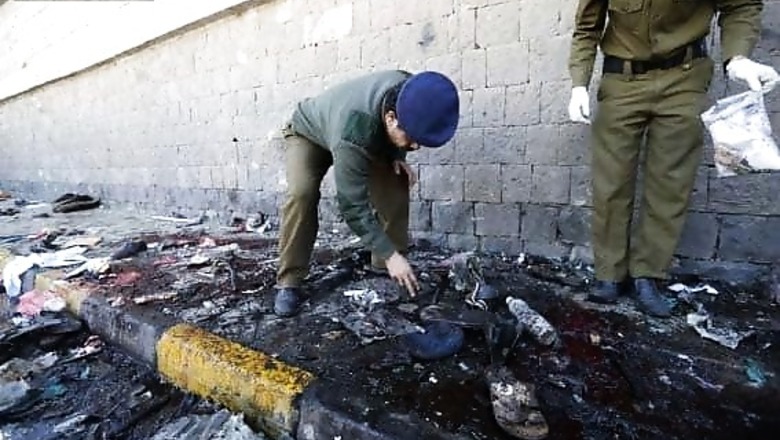
views
Sanaa: A car bomb exploded outside a police college in Yemen's capital Sanaa on Wednesday, killing 35 people and wounding dozens, police said, less than a week after a suicide bombing south of the capital left nearly 30 dead.
Yemen's sectarian conflict has worsened since September when the Shi'ite Muslim Houthi militia seized Sanaa, deepening political divides that spawned a popular uprising in 2011 and led to a change of government and splits in the army.
Al Qaeda in the Arabian Peninsula (AQAP), one of the Sunni militant group's most active wings, had staged increasing numbers of attacks across Yemen before the Houthi advance and has carried out more bombings and shootings since.
Brigadier Abdulaziz al-Qudsi, deputy general manager of Sanaa police, said that 68 people were also wounded by the explosion which sent a large plume of smoke into the sky above a densely built up and congested part of the city near the central bank and defence ministry.
"The situation is catastrophic. We arrived to find bodies piled on top of each other," a paramedic at the scene told Reuters as ambulances took casualties away.
"We found the top part of one person yelling, while his bottom half was completely severed."
Qudsi said the initial investigation showed that a booby-trapped vehicle with a driver and passenger in the front had been parked near where people who wanted to register were standing beside an outside wall of the police college.
"They then hurried out (of the bus) and escaped and then the bus explosion happened at 7 a.m. (0400 GMT)," Qudsi was cited as saying by state news agency Saba. He said several of those wounded were in critical condition.
There was no immediate claim of responsibility for Wednesday's bombing. Al Qaeda has in the past claimed they were behind similar attacks.
"NIHILISTIC VISION"
The victims from the latest blast included students at the college and people waiting in line to enrol with the police, the police sources said, as well as passers-by.
A policeman told Reuters that another car had been passing as the bomb went off and was set on fire along with everyone inside.
The Interior Ministry said it was halting registration at the police college, which takes place every year, for a week.
The U.S. embassy in Yemen condemned the attack, saying it showed the "nihilistic vision and depravity of terror groups operating in Yemen".
Western and Gulf Arab countries fear that further instability could weaken the country's government, giving AQAP more space to plot attacks outside Yemen's borders. Yemen shares a long border with major oil exporter Saudi Arabia.
Yemen's army has launched several concerted campaigns to dislodge al Qaeda with the help of U.S. drone strikes, but the militants have proved capable of entrenching themselves in largely lawless parts of the Arabian Peninsula country where it has sympathy from some Sunni tribes.
On Jan. 1 a suicide bomber killed at least 26 people at a cultural centre in the central Yemeni city of Ibb in an attack that appeared to target the Houthi militia that seized the capital in September and advanced into other areas.
Most attacks in the past four years have targeted Yemen's security infrastructure. A suicide bomber killed more than 90 people in May 2012 at a military parade, and a coordinated assault on a military hospital a year ago killed more than 50.




















Comments
0 comment